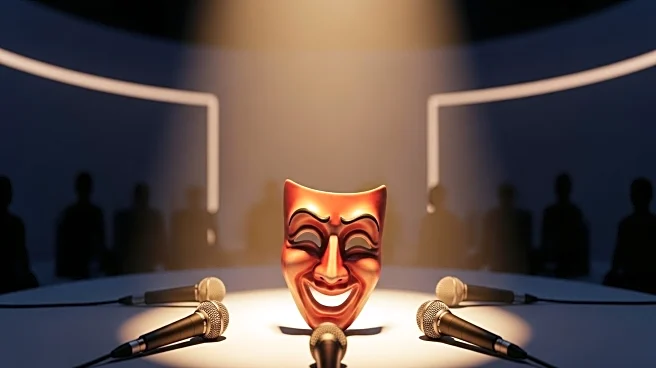What's Happening?
The Riyadh Comedy Festival concluded with American comedians returning home and discussing their participation in the event funded by the Saudi government. Comedians like Bill Burr and Louis C.K. argued that their performances could promote free speech and openness in the Middle East. Aziz Ansari expressed mixed feelings but saw the festival as an opportunity to push for more openness. Pete Davidson candidly admitted his participation was motivated by financial gain. Jessica Kirson apologized and donated her fee to charity, while Ansari attempted to donate to Human Rights Watch, which declined the offer. The festival sparked discussions on the role of comedy in challenging repressive regimes.
Why It's Important?
The participation of American comedians in the Riyadh Comedy Festival raises questions about the intersection of art, politics, and ethics. It highlights the complexities of performing in countries with restrictive regimes and the potential impact on free speech. The festival's funding by the Saudi government challenges comedians to balance artistic expression with ethical considerations. The event may influence U.S. cultural diplomacy, as comedians navigate the implications of their performances on international relations. The festival also underscores the role of comedy in fostering dialogue and challenging societal norms, potentially impacting perceptions of U.S. values abroad.
What's Next?
The debate over the Riyadh Comedy Festival may prompt further discussions on the responsibilities of artists performing in repressive regimes. Comedians and cultural figures may face increased scrutiny regarding their participation in similar events. Advocacy groups like Human Rights Watch may continue to pressure artists to use their platforms for political change. The festival's impact on Saudi Arabia's cultural landscape remains uncertain, as the government may respond to international criticism. Future festivals may see changes in participation and content, influenced by ongoing debates on free speech and ethical considerations.
Beyond the Headlines
The Riyadh Comedy Festival highlights broader cultural and ethical issues, such as the role of art in challenging political systems. It raises questions about the effectiveness of cultural diplomacy in promoting change and the responsibilities of artists in advocating for human rights. The festival may influence long-term shifts in Saudi Arabia's cultural policies, as the government navigates international perceptions. The event also underscores the power of comedy as a tool for social commentary, potentially inspiring similar initiatives in other regions. The festival's legacy may shape future discussions on the intersection of art, politics, and ethics.










